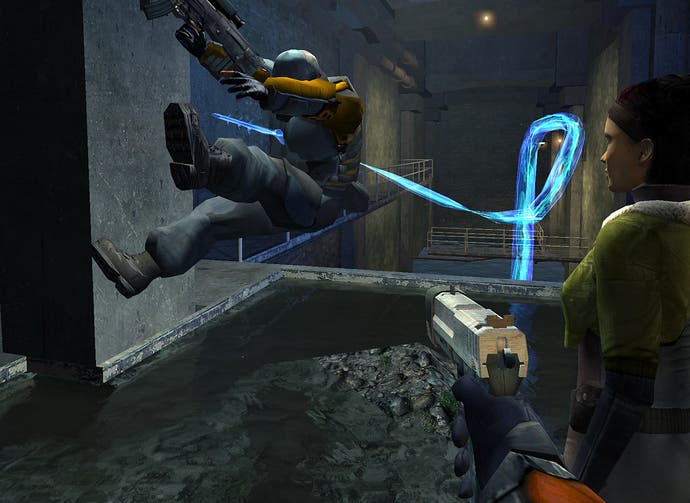Half-Life 2: $40 million in, still Steaming forward
Steam: content delivery service, poster-child for games on demand, and now part-time cosmetic surgeon. When your game costs 40 million dollars to make, why risk growing old?

Half-Life 2 has been swimming in clichés for almost a year now. Expectations have "gone through the roof" since E3 last May. Its "breath-taking" and "jaw-dropping" technology is a "quantum leap" in terms of what we've come to expect from games. It is "the full package", promising a world that combines "unparalleled visual quality" and "realistic physics" so that its "believable characters" are in a position to deliver a "brand new experience". With "improved AI" helping them along.
What makes the difference is that most gamers actually believe a lot of what they hear about Half-Life 2. The original Half-Life - rightly regarded as one of the defining moments in a genre that used to belong almost solely to the residents of Dallas, Texas - is a very solid guarantor, and, even a year on, those first shots of the game and the trade show presentations continue to reverberate around the internet with the clanging resonance of the world's biggest crowbar.
But what with source code leaks and slippage problems, these days Seattle-based developer Valve Software has to contend with a faint level of scepticism from some quarters (even if we'd wager most of its critics are just as likely to buy the resulting game as everybody else). Given the developer's widely reported problems and the game's delays, it's hardly surprising that an interview with founder and head honcho Gabe Newell is now something of a rarity. When he does pipe up though, he doesn't disappoint.
"Last time I checked, we were about $40 million into the project," he told Maxitmag this week. "Yikes, that's a scary number." It certainly is. Off the top of our collective head, it's difficult to think of another game that came close to that figure, let alone one that managed to recoup it. Final Fantasy games may involve hundreds of staff members nowadays, but other than that we're stumped.
Perhaps more interesting than the extraordinary amount of cash that has been pumped through the Valve though is Newell's comment on the developer's ambitions for content delivery system Steam, which has endured its own problems - that one might charitably put down to "teething problems".
We all expect Half-Life 2 to debut at retail and on Steam simultaneously. Valve's single-player Counter-Strike project Condition Zero will be handled this way, and with HL2 on track for a summer release by current estimates it makes sense to look at CZ's release in terms of a "dry run".
However Newell's latest comments suggest that Steam - and products like it - will play an increasingly important role in the lifespan of PC game titles, removing the need to rely on scouring download sites for weighty patches, or worse probing forums for ways to enable those 'advanced options'. Equally, products like Steam could help developers like Valve keep a game fresh relatively seamlessly. "We can use Steam to update people's games as new hardware emerges," says Newell. Imagine buying HL2 in five years' time and still being impressed as it quickly downloads support for Smell-O-Vision and bump-screen explosion effects.
"Let's say there is some new fantastic capability that emerges in the hardware, we can give updated content to all of the people who buy this hardware. Basically you'll plug in the hardware, Steam will detect it, and get the new shaders, textures, or whatever you need," he told Mixitmag. "Being able to individually deliver unique assets is a big step forward from the one-size-fits-all approach that traditional physical goods delivery has restricted us to." And as good a reason as any to stick with PC development instead of relegating it to the role of fishing for tardy console ports. If your PC version looks crap because your target platform was PS2, why not continue to update it? The possibilities are very encouraging. Sure, some folks could exploit it to justify shipping unfinished games, but then people will always exploit things if it's in their interest.
Although Steam was always going to prove useful in delivering seamless updates, it's encouraging to see that Valve looks upon it in terms of supplying polished content further down the line, just as much as it looks upon it in terms of patching problems.
Oh, and if you're wondering whether we're still on track for "summer 2004", Half-Life 2 is just "months" away, now. Months rather than weeks, that is. We'll have more details on the game's expected appearance at E3 this May - cap in hand - as soon as we get hold of them. For more from Gabe Newell - including his view of games in relation to other forms of entertainment - we suggest you check out the Mixitmag interview in full.

